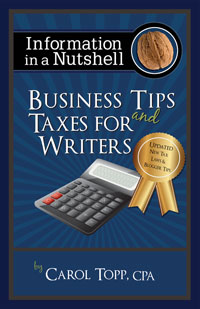Video blog: Should a writer form a corporation?
February 11th, 2013 → 8:26 am @ Carol
Here’s a short video clip of me, Carol Topp, CPA, giving a presentation to a writers group.
I’m helping writers understand which business structure is best for them.
Should a writer form a corporation, be a sole proprietor, or consider LLC status?
I really enjoy speaking to writers groups. To invite me to speak to your group, either live or via Skype, please contact me.
Here’s a list of topics that are popular with writers: Speaking topics
Carol Topp, CPA
Tags: corporation, LLC, writers, writing business


Melisha Childs
12 years ago
I did the same thing as the lady you mentioned in the video but it wasn’t for IRS purposes but in case I have legal issues. I have one self-published book but I would like to publish more and within 5 years I want to incorporate a self-publishing consulting aspect of my business. In the event that I should become successful within a few years, would you suggest that I switch over to an s-corp? Is this the one that is subject to double taxation? If so, how would the double taxation apply to me as a writer and consultant?
Carol
12 years ago
Melisha,
An S corporation is not subject to double taxation. You’re thinking of C corporations that distribute dividends. The corporation is taxed and then the shareholders pay tax again on the dividends they receive.
S corporation status is a possible option for when your business grows to publish other writers and those authors bring in income. But if all the income is done by you (self-publishing your own books and consulting), then S corporation status will probably not bring any tax benefits over being a sole proprietorship. The reason is that an S corporation needs pay the owner a salary for the work they personally perform.
I cover the pros and cons of S corporation status in my book Business Tips and Taxes for Writers.
Carol Topp, CPA